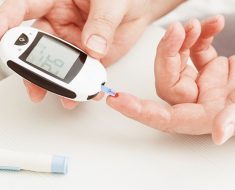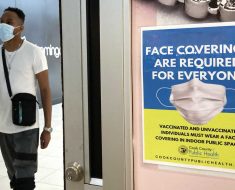For certain blood cancers, such as acute myeloid leukemia (AML) and myelodysplastic syndrome (MDS), deciding whether patients need an aggressive treatment typically hinges on a set of lab tests to identify genetic changes.
Some of these tests rely on technology that was invented more than 60 years ago and has been used clinically for the past three decades.
Now, a new study from Washington University School of Medicine in St. Louis shows that whole genome sequencing is at least as accurate and often better than conventional genetic tests that help determine the treatment for a patient's blood cancer. Genome sequencing technology continuously is decreasing in cost and recently reached a level similar to that of conventional testing. In addition, results can be returned to patients in just a few days, making whole genome sequencing a potentially viable approach for determining the best treatment regimen for a particular patient.
The study is published in the March 11 issue of The New England Journal of Medicine.
Choosing the appropriate therapy for cancer patients often depends on identifying a range of different types of genetic changes in a patient's tumor cells. Our study suggests whole genome sequencing is a reliable and practical approach for detecting all of the changes that are important for assessing the risk of relapse for AML and MDS patients, using a single test. This approach can be performed when conventional testing methods are unsuccessful and also could be applied to other cancers, including solid tumors. This means that patients with other cancer types eventually could benefit from rapid clinical genome sequencing."
David H. Spencer, MD, PhD, Study Senior Author and Assistant Professor of Medicine and Medical Director of Clinical Sequencing Facility, McDonnell Genome Institute
The study focused on patients with AML, a blood cancer that arises in the bone marrow, and MDS, a group of disorders in which the bone marrow does not make enough normal blood cells. Both often are deadly, but many patients can be treated more effectively if they receive the proper therapy.
Patients with leukemia or MDS are divided into three risk categories based on the results of genetic testing. Favorable-risk patients are usually treated with chemotherapy only. Unfavorable-risk patients often need more intensive treatment at the time of diagnosis -; usually chemotherapy and a stem cell transplant (formerly called bone marrow transplant). For intermediate-risk patients, the optimal treatment approach is not as clear-cut, and their treatment regimens can vary, depending on each patient's state of health, personal preferences, and doctors' guidance.
For nearly three decades, patients have been assigned to these risk categories based on the way their chromosomes look under a microscope. More recently, doctors have begun to incorporate the genetic sequencing of a limited number of genes into the analysis, but such sequencing does not typically identify all of the changes that are important for guiding treatment decisions. Whole genome sequencing can identify changes in chromosomes and genes, but is rarely performed outside of research studies because of its cost and the time it can take to sequence and analyze an entire genome.
"For these types of blood cancers, conventional chromosome analysis is a critical part of the standard diagnostic work-up," Spencer said. "We know from research studies that whole genome sequencing can detect these types of chromosomal abnormalities, so that part of our study is not terribly surprising. What we showed is that genome sequencing has reached a point that it is now practical, fast, economical, clinically feasible and accessible for the routine testing of patients."
According to the researchers, the technical costs for sequencing in this study were about $1,900 per patient. This amount is similar to the laboratory cost of conventional genetic testing for an AML patient, which typically is $1,000 to $2,000. Actual charges for clinical use of whole genome sequencing will likely be higher because of additional costs associated with implementing such testing in a clinical laboratory setting.
In the new study, the researchers -; including co-authors Eric J. Duncavage, MD, a professor of pathology & immunology; Molly C. Schroeder, PhD, an assistant professor of pathology & immunology; and Timothy J. Ley, MD, the Lewis T. and Rosalind B. Apple Professor of Medicine -; evaluated blood samples from 263 patients with these blood cancers by sequencing the patients' entire genomes, and compared these results with traditional genetic tests from the same patients. The patients were treated at Siteman Cancer Center at Barnes-Jewish Hospital and Washington University School of Medicine.
The researchers found that whole genome sequencing identified all of the same major genomic abnormalities as the conventional method -; called karyotyping -; and, importantly, it identified additional genetic abnormalities in 17% of the cases. Of the 263 patients, 117 were newly diagnosed patients; the other patients' samples were analyzed retrospectively.
For the newly diagnosed patients, whole genome sequencing found additional genetic information in about 25% of the cases. This new information changed the risk category for 19 patients. Generally, changing the risk category may alter patients' treatment options. The investigators also showed that this sequencing could be done relatively quickly, returning results in an average of five days but in as few as three.
One of the drawbacks of karyotyping is that some patients have inconclusive results. Karyotyping requires a sample that contains living cells, and sometimes the sample doesn't contain enough living cells to determine the patient's risk category.
Whole genome sequencing, in contrast, does not require living cells. It uses only a small sample of DNA from a patient's cancer cells. In this study, the researchers found that whole genome sequencing could accurately risk stratify patients who had inconclusive results from the traditional karyotype-based analyses. According to the investigators, inconclusive results or assay failures can occur in up to 20% of AML patients.
"Inconclusive results are extremely frustrating, because we want to be able to offer patients the most appropriate treatment at the beginning of therapy. Although limited genetic testing is of value, it can miss important findings that are often relevant for therapy choices. We have worked for years to streamline whole genome sequencing so that it can be used routinely," said Ley, who led the team at McDonnell Genome Institute that sequenced the first cancer genome (from an AML patient) just 12 years ago.
"The sequencing of whole cancer genomes, which was first performed here at Washington University, revolutionized our understanding of cancer and how it can be treated," Schroeder said. "This project was exciting to work on because it demonstrates that whole genome sequencing has matured into an efficient, practical tool that is clinically useful for patient testing when they receive a diagnosis of AML or MDS."
According to Spencer, most patients whose risk category changed based on the whole genome approach moved into less favorable risk categories. This suggests that whole genome sequencing may be able to more consistently identify patients in the unfavorable-risk category, allowing them to receive the most appropriate therapy up front.
The researchers will continue to evaluate whole genome sequencing for AML and MDS patients as part of clinical trials. In addition, whole genome sequencing will be offered to patients with AML and MDS treated at Siteman Cancer Center. For those who qualify, funding for the whole genome sequencing assay, called ChromoSeq, will be provided by BJC HealthCare.
"One of the most compelling aspects of this study is that the results are immediately translatable to patient care," Duncavage said. "As a collaboration with the McDonnell Genome Institute and the Department of Pathology & Immunology, we are pleased to be launching a clinical version of this assay that will be available to patients. We are proud to be able to offer whole genome sequencing for AML and MDS patients, and we hope to extend this to other cancers very soon."
Peter Campbell, MD, PhD, leads cancer genome sequencing studies at the Wellcome Sanger Institute in Cambridge, U.K. "We stand on the threshold of an era in which we can identify every relevant genetic change in a given patient's cancer in real time," said Campbell, who was not involved in this work. "This fascinating study demonstrates, first, that this technology can be implemented in real-world clinical practice, and second, that we can make more accurate choices of treatments for patients with blood cancers. Our task is now to take this blueprint for blood cancers and apply it to all cancers."
Washington University in St. Louis
Posted in: Medical Science News | Medical Research News | Medical Condition News
Tags: Acute Myeloid Leukemia, Assay, Blood, Blood Cancer, Bone, Bone Marrow, Bone Marrow Transplant, Cancer, Cell, Chemotherapy, Children, Chromosome, Cytogenetics, Diagnostic, DNA, Genes, Genetic, Genetic Information, Genome, Genomic, Genomics, Healthcare, Hospital, Illumina, Immunology, Laboratory, Leukemia, Living Cells, Medical Research, Medicine, Microscope, Myeloid Leukemia, Oncology, Pathology, Reagents, Research, Syndrome, Transplant, Tumor, Whole Genome Sequencing
Source: Read Full Article





